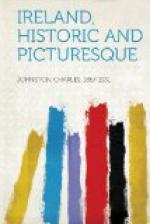The shield of Concobar was struck so that it moaned, and the three Waves of Erin, the Wave of Clidna, the Wave of Rudraige, and the Wave of Tuag Inbir echoed that moan, and all the shields of the Ulaid resounded, every one of them that was on their shoulders and in their chariots. As the Ulaid were retreating, fresh troops came up for them under Conall Cernac. A tree of shelter and a wreath of laurel and a hand above them was Conall to them. So their flight was stayed. Then Conall drew the sharp long sword out of its sheath of war and played the music of his sword on the armies. The ring of Conall’s sword was heard through the battalions on both sides. And when they heard the music of Conall’s sword their hearts quaked and their eyes fluttered and their faces whitened, and each of them withdrew back into his place of battle and of combat. But so fierce was the onset of the southern armies that the fight of the Ulaid against them was as a breast against a great flood, or an arrow against the rock, or the striking of a head against cliffs. Yet through the great might of Cuculain the Ulaid prevailed, and Cairpre the King of Tara was slain. After the battle, Concobar spoke thus: “There were three sons of Ros Ruad the king—Find in Alend, Ailill in Cruac, Cairpre in Tara; together they performed their deeds of valor, the three brothers in every strife; together they used to give their battle. They were three pillars of gold about their hills, abiding in strength; great is their loss since the third son has fallen.”
VII.
Find and Ossin.
A.D. 200—290.
Seventeen centuries ago, two hundred summers after the death of Cuculain the hero, came the great and wonderful time of Find the son of Cumal, Ossin the son of Find, and Find’s grandson Oscur. It was a period of growth and efflorescence; the spirit and imaginative powers of the people burst forth with the freshness of the prime. The life of the land was more united, coming to a national consciousness.
The five kingdoms were now clearly defined, with Meath, in the central plain, predominant over the others, and in a certain sense ruling all Ireland from the Hill of Tara. The code of honor was fixed; justice had taken well-defined forms; social life had ripened to genial urbanity. The warriors were gathered together into something like a regular army, a power rivaling the kings. Of this army, Find, son of Cumal, was the most renowned leader—a warrior and a poet, who embodied in himself the very genius of the time, its fresh naturalness, its ripeness, its imagination. No better symbol of the spirit of his age could be found than Find’s own “Ode to Spring”:
“May-day! delightful time! How beautiful the color! The blackbirds sing their full lay. Would that Laigay were here! The cuckoos call in constant strains. How welcome is ever the noble brightness of the season. On the margin of the leafy pools the summer swallows skim the stream. Swift horses seek the pools. The heath spreads out its long hair. The white, gentle cotton-grass grows. The sea is lulled to rest. Flowers cover the earth.”




